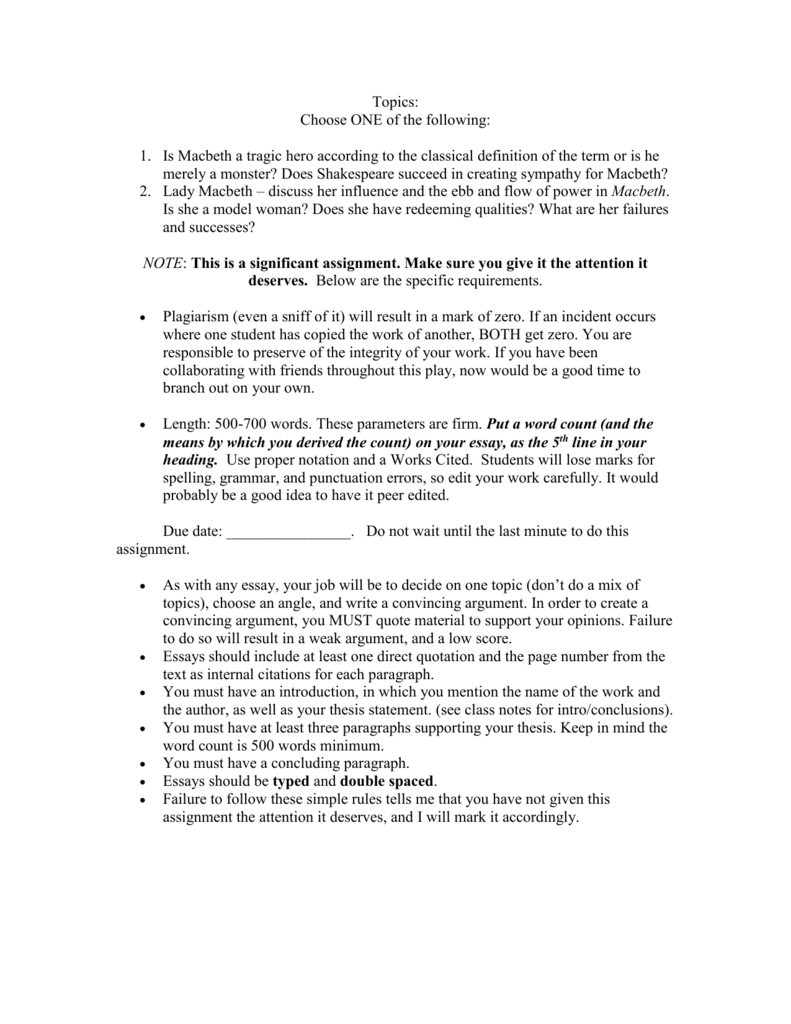
Such lines evoke an air of deep doubt: while polarities are reversed and founded values are overturned, it is totally ambiguous regarding if the dichotomous clarity of “heaven or hell” trumps the equivocatory fogginess of “fair is foul, and foul is fair.” Therefore, for Macbeth, this means an uncertainty as to perhaps the prophecies are believable. In a similar fashion, many scenes conclude with lines of dichotomy or equivocation: “Hear it maybe not, Duncan for it is a knell / That summons thee to paradise or hell” (IWe i64) “God’s benison opt for you, along with those/ That would make good of bad, and friends of foes” (IWe iv 41-42). The very first scene of the first work concludes with these words for the witches, which Macbeth echoes in their very first line: “So foul and fair daily i've perhaps not seen” (I iii 36). “Fair is foul, and foul is fair / Hover through the fog and filthy air” (we i 10-11). The dichotomy involving the natural while the supernatural forms a backdrop that implies the epic proportions associated with the fight throughout the Scottish crown. Whereas Macbeth believes he will live the “lease of nature”-since Birnam Wood cannot possible come to Dunsinane Hill-the forest is literally uprooted by the English army according to the prophecy. Even the activities leading to the final outcome of this play is grasped as a negotiation of the normal and supernatural. In identical scene, the Old Man and Ross both agree that they saw horses consume one another. Similarly, Ross notes that “the heavens, as troubled with man’s work, / Threatens his bloody stage” (weI iv 5-6). Following Duncan’s death, Lennox defines the “unruly” night in some information. In the event that witches’ prophecy is understood to be imposing a supernatural purchase on natural order of things, the normal purchase can also be grasped as responding with tempestuous signs. Macbeth is the only one who views the ghost in a crowded room is this just one more projection of his feverish brain? Or perhaps is it certainly, as we say, a supernatural occurrence? Such ambiguities play a role in the eerie mood and sense of uncanniness that pervade the play, through the extremely opening scene with the three bearded witches.

But the matter is less clear when it comes to Banquo’ ghost. The 3 apparitions that the witches summon, like, are usually taken fully to be “real”-even if perhaps as supernatural occurrences. In exactly what issues ghosts and visions, the relation regarding the natural towards supernatural in Macbeth is ambiguous. In the same way an overwhelming accountable conscience drives Lady Macbeth mad, so too does Macbeth’s “heat-oppressed” brain project the eyesight of a dagger before he murders Duncan (weI i 39).

Macbeth, on the other hand, appears to overcome the guilt that plagues him in the beginning in play. Different ways that the Macbeths handle their crimes reveal how their characters develop: whereas Lady Macbeth is at first the main one without scruples, urging Macbeth to take action, it really is an overpowering feeling of guilt and remorse that drives the girl to the woman untimely death. In the beginning physical remainders of a regrettable crime, the royal bloodstream will leave permanent marks regarding psyche for the few, forever staining these with guilt and remorse. just what, will these hands ne’er be clean?” (V We 30-37). Similarly, Lady Macbeth is suffering from a “spot” that she cannot remove from her hand: “Out, damned spot! Away, I say. “Will all great Neptune’s ocean wash this blood / Clean from my hand?” exclaims Macbeth after he stabs Duncan (weI ii 58-59). As it turns out, the prophecies aren't just fated but fatal, as Macbeth's confidence inside witches leads him to fight a rash battle in the last act.Ī few of the most famous and poetic lines from Macbeth are expressions of remorse. The witches understand Macbeth’s tragic flaw: offered the irresistible urge to become King, he will elect to commit murder despite the fact that he could merely discard their words. But one also wonders: Would Macbeth have actually committed such heinous crimes if you don't the prophecy? Imagine if he had ignored the witches’ statements? Such conjecture, nevertheless interesting, ultimately seems useless, considering that the prophecy itself is self-fulfilling. The prophecy lovers the flames of aspiration within Macbeth and Lady Macbeth, serving whilst the primary impetus the couple to plot the death of Duncan-and subsequently Banquo.

The plot of Macbeth is scheduled in motion basically by the prophecy of three witches. Cite this essay: APA, MLA, Harvard and other ↓


 0 kommentar(er)
0 kommentar(er)
